If you have a brick and mortar business, then you just can’t beat Local SEO for visibility. Learning what is Local SEO? You need a digital presence and a local SEO blueprint to drive new customers to your business.
Here’s why:
1. 90% of the business goes to the businesses in the local 3-pack.
2. Google is doing its dead level best to keep users on their page, not yours. Their efforts are working. So you’ve got to make their efforts work for you.
3. Doing local SEO right can triple or quadruple your ROI. I’ve worked with companies who have helped clients use local SEO to take their average call volume up by as high as 82% by paying close attention to local SEO and not much else. What could you do with 82% more leads to pursue?
Should you do it yourself? You can, just keep in mind that DIY local SEO is a little like DIY divorce. It’s simple until it isn’t.
It may be a good idea to do as much as you can by yourself, then reach out to specialists to tackle the stuff you can’t, or don’t want to, do by yourself.
Table of Contents
How To Improve Local SEO Results: General Principles
This article is not intended to be a Local SEO for beginners article, but knowing the basic concepts will be helpful.
Understand the ranking factors that matter.
According to the Moz Local Ranking Factors Survey, the top 3 are:
1. The strength of your Google My Business Profile.
2. The strength of your link profile.
3. The quantity, quality, diversity, and number of reviews in your review profile across multiple sites.
This means if you don’t really have time to add more content to your website you may be in luck, because over half of your success is going to come from factors that don’t have anything to do with your website.
There’s been a lot of back-and-forth about citations* in the industry of late. Some local SEOs are saying they don’t matter much anymore. Some are saying they absolutely do.
The answer? You probably shouldn’t ignore them yet. The Moz Local Search Ranking Factors survey says they still account for 10.82% of your rankings.
They’re also an easy source of inbound links.
Krystal Taing (@krystal_taing) of Rio SEO reiterates that citations are still alive and well.
“Our primary focus is ensuring the brands we represent are visible, accurate, and duplicate-free on all the sites most important to their industry and clients. This is still a critical element to a seamless and successful consumer journey.”
Krystal makes such an important point here.
It’s not necessarily about what Google thinks about your citations. It’s about whether your customers can find you wherever they happen to be.
Still, you don’t have to go crazy.
Five or six years ago the the name of the game was identifying every god-awful obscure directory in existence, only to have some poor local SEO person painstakingly work their way through every one of the absolutely insane and inane data entry and verification processes these sites made you go through.
Today, the game has changed.
Or, as Vice President of SearchLab Chicago Greg Gifford (@GregGifford) says,
“Citations aren’t dead—but they’re definitely on life support. As Google’s algorithm has evolved, citations have become less and less weighted. In the old days, it was important to blow out as many citations as possible. Now, you’d just be spinning your wheels. A business with 20 citations isn’t going to be in worse shape than a business with 200. Basically, as long as you’re on the primary aggregators and you’re correctly listed on the sites that potential customers might see, you’re good.“
In other words, focus on a handful of really high-impact, relevant sites. Not a bad change.
*Not sure what citations are or how to build them? Check out A Guide to Local Citation Building on The Search Engine Journal.
Short answer: It’s a jargony way of saying “your complete and accurate name, address, and phone number, listed on directory sites, preferably the same way each and every time.
Review management is an essential part of any Local SEO strategy
7 Things Every Local Business Can Do To Improve Their Local SEO Results This Year
These action items shouldn’t take you more than a weekend to do, though some of them will require ongoing engagement:
1. Pull up your GMB profile. Make sure your entire service area is covered. Take the opportunity to fill out any parts of your profile that have been left blank.
2. Sit down and brainstorm 48 pieces of content you can use on Google posts. These can be:
- Deals and specials
- Videos of your team doing their work
- Photos of your finished work
- Short tips and reminders (i.e. it's time to clean your gutters)
- Event announcements
- Other announcements

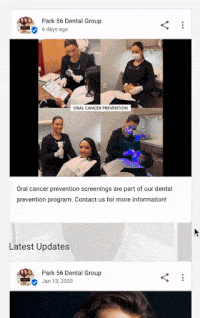
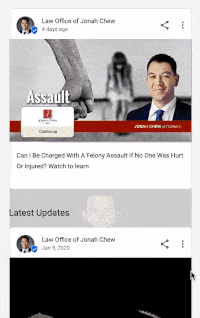
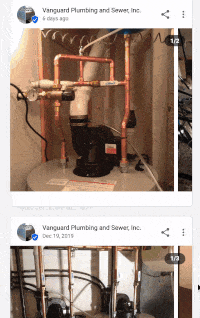
Download a tool like OneUp or Sendable to schedule the posts in advance. If you use this to run specials, place them in your calendar so you don’t forget you’re running them.
This exercise gives you one Google Post per week, which is really all you need. You can complete this planning in one afternoon. You can do more if you want, but one a week will make you look active and will keep your GMB profile interesting.
3. Pull up your customer list from last month. Send a personalized email to each customer with your name on it and their name on it, requesting a review on Google My Business.
4. Put together your review strategy for this year. Remember there’s no fixing it and forgetting it here. You have to figure out what you’re going to do, and you have to be consistent.
A lot of this work will involve coaching yourself and your employees to ask for reviews in person.
5. Identify 12 topics to pitch to local reporters. Local papers and TV stations run “don’t forget, homeowners” style stories all the time.
There’s no reason you can’t be their quoted expert. Here’s a great guide on how to pitch stories to your local press outlets. Do this and you’ll give yourself a good shot at creating some high-value local links this year.
6. Use a tool like ZipSprout to identify local sponsorship opportunities which might grant you some links. Target 10-12 of them.
Some might be too rich for your blood, but some might be perfect. You’ll also meet people, grow connections, and show you care about the community. Not a bad combination.
7. Download the Google My Business Mobile App to your phone so you can receive messages from customers.
Use your mobile phone to respond to them as fast as you can all year long. It’s the 21st century version of taking phone calls.
Anyone younger than 45 probably thinks, “ugh” if they have to make a phone call, so don’t make them. Get into your settings so your phone makes a noise you’ll pay attention to when someone sends you one.
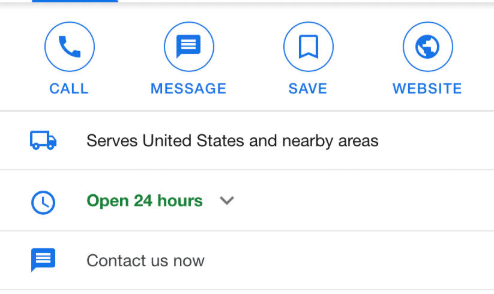
Have lots of locations? Local seo for multiple locations in one city, or in multiple cities, isn’t that hard. You just do the right things for every location, treating each as its own entity until you get to your web page, where you might give each location its own specific page.
Now we’re going to get granular by helping you address some industry-specific issues, as well as some opportunities for link building.*
*If you’re unfamiliar, link building (or getting high-quality links from 3rd party sites) is an important method for growing your site traffic. It also sends trust signals to Google, causing them to rank your business higher.
Local SEO for Contractors
Home service area businesses have perhaps the absolute greatest number of Local SEO challenges, and have for awhile now. That’s because GMB is still largely aimed at people who have one brick-and-mortar location and who see people at their location.
Fortunately, GMB’s getting better. Last year they rolled out a new set-up wizard specifically for service area businesses. Take advantage of it.
While you’re at it, take the time to make sure you’ve created the perfect home services listings on top industry sites like Google, Angie’s List, and Home Advisor. Want to steer your reviews in an especially helpful direction this 2020? Then check out these tips and insights.
Now let’s talk about building you some local links. Link building remains one of the most challenging (and frustrating) aspects of Local SEO. It’s not something you can automate, and it takes time, effort, and outreach.
Still, beyond the sponsorships I’ve already mentioned, there are a few strong link-building opportunities you can focus on.
1. Identify some topics to pitch to local reporters. Local papers and TV stations run “don’t forget, homeowners” style stories all the time.
There’s no reason you can’t be their quoted expert. Here’s a great guide on how to pitch stories to your local press outlets.
2. Volunteer! Local charities are strapped for cash. They may need a contractor like you to fix their plumbing, put new roofing on, or replace the AC. Give them those services and the products for free.
There’s a good chance you’ll get covered by local news outlets. They may also blog about it, and link to your company website.
Even if you don’t get a link, the goodwill you stir up and the connections you make could be a source of customers well into the future. While you’re at it, don’t forget to ask your contacts at these organizations for a review.
3. Join a local association or two, especially if they have online directories.
Look for other opportunities throughout the year. For example, does your hometown paper run a “best of” vote every year? You might want to ask your customers for their votes.
Local SEO for Doctors
Doctors. Your issue is jargon. Joe and Jane user are never going to search for a “nephrologist.” They’re going to search for a “kidney doctor.” Some of you have specialist titles so long and complex nobody can even spell them (otolaryngologist, anyone)?
You can put the jargon on your profiles if you want, but check your categories, write-ups, and other business details. Are the layperson words there? No? Put them in.
Worth mentioning on your profile write-ups: which insurances you take, and whether you accept cash payments.
Some of us don’t have insurance. Some of us have weird plans because it was the only affordable thing we could find on the exchange. Alleviate our anxiety. The lower our anxiety, the higher your conversions.
For more insights into what your patients are thinking about as they evaluate your business, see Healthcare Industry Review Management Tips and Insights. Then, head over to Building the Perfect Profile on Healthcare Review Sites to make sure you’ve targeted top spots to find doctors. Healthcare reviews are essential to ranking locally as a doctor as well.
On to link building. Your best opportunities are:
1. Charity health days. A lot of people can’t afford healthcare at all. Dedicating a single day where people can just come in and get care is huge.
Publicize it well in advance and take lots of pictures. Call your local news outlets to let them know you’re doing it. Someone is likely to run the story, and you’ll feel good about yourself, too.
Bonus: not all these patients will be poor forever. Some will go on to change their lives, and when they do, they’re likely to give your office priority.
2. Look for opportunities to be the expert in healthcare stories. Help a Reporter Out is a great resource here. Someone’s seeking health insight every week like clockwork.
Your local news outlets are running the same sorts of stories. Cultivate relationships with reporters so that those who need quotes will come to you first.
3. Pay attention to events. Look for charity events for local health causes, such as 5K Races for the Cure. Look for community fairs too. You can set up a booth there, or you can simply serve as a sponsor.
Another good opportunity for link building? Run a search for your specialty + reviews. There are some hyper-specific ones, like RealSelf for plastic surgeons.
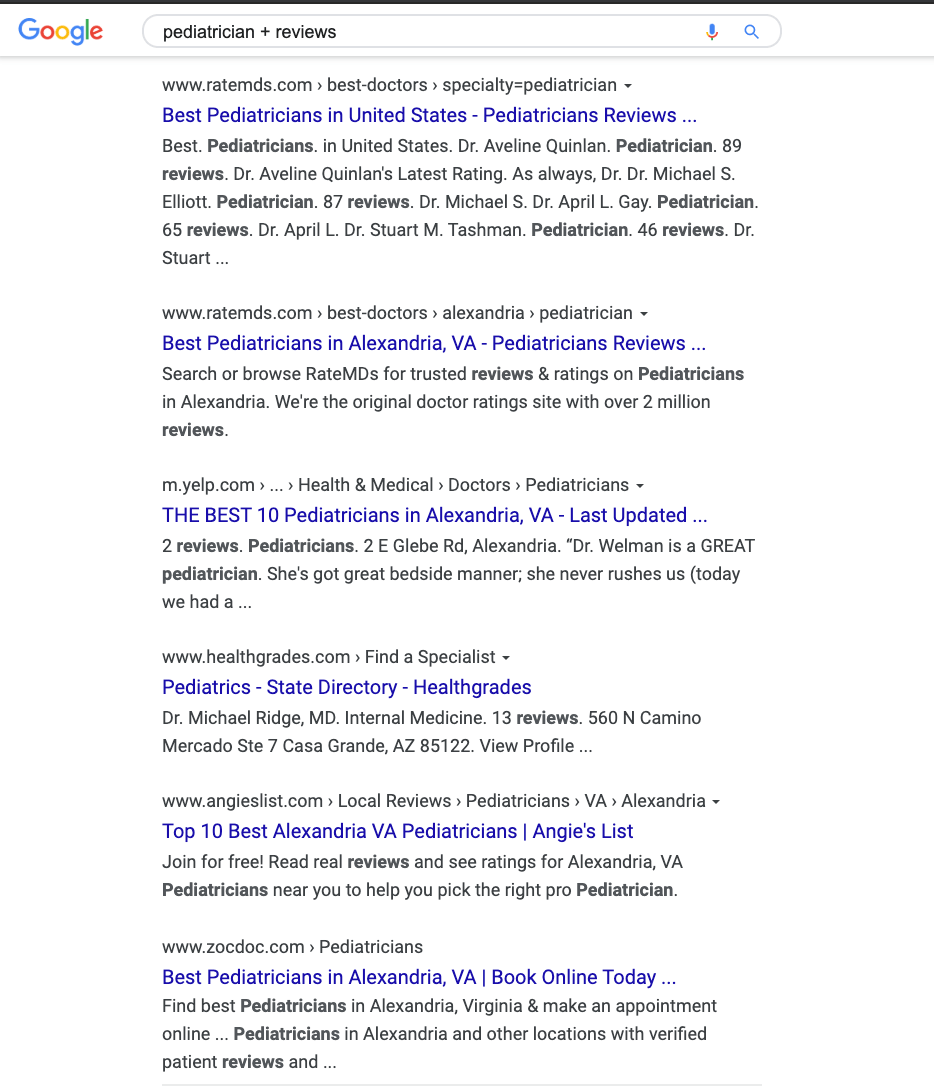
Take advantage of them by claiming your profile. You’ll get another place to collect reviews, too. Low-hanging fruit and not ultimately the most valuable link you’ll ever build, but why leave it on the table?
Local SEO for Hotels
Google My Business is packed with features for hotels. They’ll list prices on every booking site, give you a button so people can book rooms directly from GMB, and have a fantastic location overview feature that will show people what you’re close to.
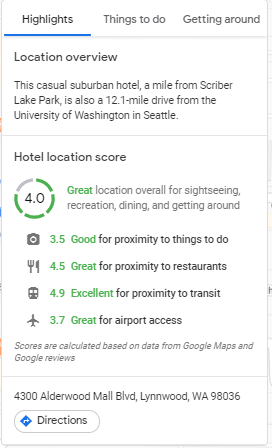
All of these features are a little controversial. There is plenty of talk about how all these booking sites are hurting the hospitality industry.
Unfortunately, this is the game we’re all playing. If you’re going to use local SEO as your strategy, you have to account for this stuff, you’re going to find an awful lot of similar issues on other directory sites as many others earn hefty commissions by getting people to book with them.
That doesn’t mean you can’t try to bring some traffic directly to your site. Here are some link building opportunities worth pursuing:
1. Event hosting. If you’re already doing a brisk trade in events this isn’t a problem for you. Every convention you host is already linking to your hotel.
But what if you’re a smaller concern who isn’t getting all that big convention traffic? What if you’re in an out-of-the-way place?
You can still offer your conference room or dining room to local organizations who might want to run seminars or classes.
2. Not the host of the huge events? You can still get a link. Contact them to let them know you’re willing to offer a discount to their attendees in exchange for a link.
Conventions often have more attendees than hotels have rooms to house them.
All those other people will need somewhere else to stay. Why not your hotel?
3. Put out high-quality guides. Are you a hotel in Chicago? Tell us about Chicago’s most overlooked restaurants or attractions. Do you have travel advice? Share it.
Look to place this content off-site. Make it strong, in-depth, and cool to give it a better chance of finding its way onto a travel website that can help you.
Warning: you may want to pitch this content to site owners before bothering to write it. There’s nothing worse than writing a huge piece of guest-post content only to find you can’t place it anywhere.
Finally, for some thoughts on setting your review management strategy this year, check out Hospitality Review Management Tips and Insights and Building the Perfect Online Listing in the Hospitality Industry.
Local SEO for Lawyers
Attorneys need to focus on identifying challenges hampering their review strategy. 2020 will be all be about finding creative solutions for those challenges, whatever they are.
For additional help, check out Legal Industry Review Management Tips & Insights, as well as How to Build the Perfect Legal Industry Listing on Google, Avvo, and Other Platforms.
On to link building.
1. There’s a legal angle to almost every issue under the sun, so build relationships with local reporters and check Help a Reporter Out every day. If you’re willing to lend your expertise there are reporters who are all too happy to quote it.
For more ideas on interacting with reporters, check out Four Things Attorneys Can Do to Succeed at Media Outreach, from the ABA website.
2. Offer high-value content that you write yourself to people whose industries you touch. Are you a real estate lawyer? Reach out to local realtors and offer to write guides they can pass on to their customers.
For example, a commercial realtor might like a guide to due diligence. A residential buyer’s agent might like to have a write-up on what they can do if a seller failed to disclose problems with a house.
Do you have to write them yourself? Well…yes and no.
There are writers out there who are real good at Google-Fu and who can probably get you about 90% of the way there. But if you want the thing to be truly valuable and link-worthy, you’ve gotta get in there, edit it, and flesh out what your third party writes.
Most content writers aren’t lawyers, so they’re going to miss nuances. They’ll never go as in-depth as you can and they’ll never be able to say, “Once I had a case where x, y, and z happened.”
Resign yourself to getting involved in the process and you’ll create resources local partners will really want. By the way, you will tend to get business from the guide, not just from the link, making the exercise doubly valuable.
3. If you’re not already writing for legal publications, this year may be the year to start.
It’s a lot to pack into an already packed schedule, but try to set aside at least one or two days a month to pursue these avenues.
Local SEO for Restaurants
Restaurant owners have no trouble scoring reviews on just about any site. In fact, try to keep guests from writing reviews on any site they like. Go on. Try.
Or, don’t, and focus on correcting real mistakes many restaurants continue to make, like:
1. Running a Facebook page as your restaurant webpage.
Facebook pages are a pain to navigate, and they make it hard to tantalize people into anticipating your food.
Restaurants may be the only industry who actually needs to make their own website a cornerstone of their local SEO strategy this year.
2. In the same vein: failing to get your menu posted somewhere accessible.
Don’t rely on Grubhub or other third party delivery sites. They tend to post just half of the menu. Grainy photos of your paper menus don’t count as accessible.
3. If you take reservations, make it possible to book a table through GMB. Again, nobody wants to call anyone else for any reason if they can avoid it.
If you are short on reviews, focus on getting foot traffic through other, more offline-oriented means, then train your staff to ask every customer who seems happy for a review on any site the customer likes.
Want to gather email addresses so you can automate a little more? Put out a paper guestbook.
As for link building, you’ve got three solid opportunities.
1. Events in-restaurant. Really reach out to local organizations and let them know you have space available for small events. Those who take you up on it might publish a link to your business when they publicize the events.
2. Event participation. Find ways to show up at other people’s events, including “taste of” events. You might also offer to cater local charity events.
3. Local travel and food bloggers. You can invite them to your restaurant to try new dishes. Just invite them: don’t make them promise to give you a write-up. If they appreciate what you do, they will, and you’ll get the publicity.
Finally, look through your recipe books. Got something you don’t serve anymore? Repurpose it. Turn it into a blog post, complete with pictures, and submit it to another site for publication.
Local SEO for Everyone Else
By now you get the idea, and going through every single industry is beyond the scope of this article. Start with the generalized list above. Then start thinking about industry-specific sites and link building opportunities.
To set your review strategy, and to get you started, here are links to guides we’ve written up for several other industries.
Local SEO for Car Dealers
Local SEO for Realtors
Local SEO for Wedding Vendors
Local SEO for Elder Care Businesses
Local SEO for Financial Services
Takeaways
Are these blueprints everything you could possibly do to improve local SEO this year? Of course not. You could improve your schema, add more content to your website, and do some really intensive Local SEO keyword research to identify opportunities, too.
The idea behind these blueprints is to focus on high-impact actions you can take in a very short period of time so you get the best results you can get without spending a lot of time on the process.
Everything else could be outsourced to professionals, or left for another day, depending on your results.
Don’t let the perfect be the enemy of increasing your call volume. Take a weekend, get it done, and pat yourself on the back. By the time you do, you’ll have earned a little R&R…and a lot of business.
Additional Resources
Here are a few additional helpful resources from experts around the web:
Phil Rozek – Local SEO Audit Checklist
Backlinko – A Local SEO Ultimate Guide for 2020
SEMrush – A Local SEO Case Study
Ahrefs – A Local SEO Full Guide
Nightwatch.io – Local SEO Checklist










